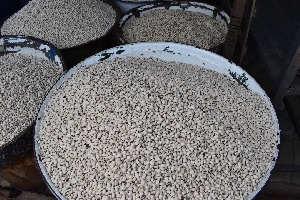- Home - News
- Elections 2024
- News Archive
- Crime & Punishment
- Politics
- Regional
- Editorial
- Health
- Ghanaians Abroad
- Tabloid
- Africa
- Religion
- Photo Archives
- Press Release
Regional News of Thursday, 5 June 2025
Source: www.ghanawebbers.com
Why Songotra-T cowpea seeds availability is key for survival of farmers in Northern Ghana
Aminu Alhassan is a cowpea farmer in Nanton District, Ghana. For years, his biggest challenge was feeding his family. He lacked advanced tools and technology but remained determined. When a Maruca infestation hit local farms, Aminu took action. He traveled to secure pesticides for fellow farmers.
Aminu realized traditional methods couldn’t stop the Maruca vitrata pest. This pest destroys 20% to 80% of cowpea yields. “I always wished there was a better way,” he said. One day, he sought answers in a nearby community and found them.
There, he met an Agricultural Extension Agent from the Ministry of Food and Agriculture. The agent introduced him to a genetically modified cowpea variety resistant to Maruca vitrata. “This got me and my colleague excited,” Aminu recalled. “I could now farm as a business instead of just surviving.”
Aminu joined farmers working with CSIR-Savanna Agricultural Research Institute (CSIR-SARI) on the Songotra T Cowpea project. “I planted one acre during last year’s drought, and the outcome was amazing,” he said. While others harvested nothing, I got something from the PBR Cowpea.” He only sprayed twice instead of twelve times.
He harvested 9 to 10 kilograms and plans to expand his acreage. “Songotra T Cowpea is salvation for farmers battling pests and climate change,” he declared. However, access remains an issue: “We need timely access to seeds.”
Dr. Jerry Nboyine leads the BT Cowpea Project at CSIR-SARI in Nyankpala. He explained that Maruca vitrata is a major threat to cowpea production in Ghana. It can cause yield losses up to 80% by destroying flowers and pods.
The BT Cowpea variety received approval in July 2023 and has built-in resistance against Maruca larvae. “When they try to feed on the plant’s flowers or pods, they die,” Dr. Nboyine said. This reduces pesticide use; farmers spray only twice per season for other pests.
Field trials showed clear results under drought conditions as well. In 2023, only farmers planting Songotra T Cowpea successfully harvested when rains were delayed in Northern Ghana.
Dr. Nboyine reported over 7,000 kg of breeder seed produced so far for nationwide distribution efforts. “We are committed to making high-quality seeds accessible at standard prices,” he assured buyers outside Tamale.
CSIR-SARI partners with licensed seed companies for national coverage while focusing on regulated distribution processes.
Abdulai Abdulai Rafael, CEO of Prosperity Farms, praised the innovation's impact on agriculture and seed business growth.
Alhassan Alhassan Baba from Heritage Seeds Company Ltd confirmed rising demand for Songotra T seeds due to their consistent yield under erratic rainfall conditions.
Distribution has reached several districts in Northern Ghana but challenges remain regarding timely access to seeds.
“Getting seeds on time remains a major challenge,” one farmer noted about distribution delays holding them back despite interest in innovations like this one.
The CSIR-SARI-led innovation has proven effective; large-scale multiplication and distribution are essential now.
“The solution is here; farmers want it,” Aminu stated firmly about government support needed for this process.
As pest pressure increases alongside climate change impacts, this story highlights resilience through innovation aimed at feeding a nation effectively.
“The world divides between those who cannot sleep because they are hungry and those who fear them.” We must act now—better production means better nutrition for all.











